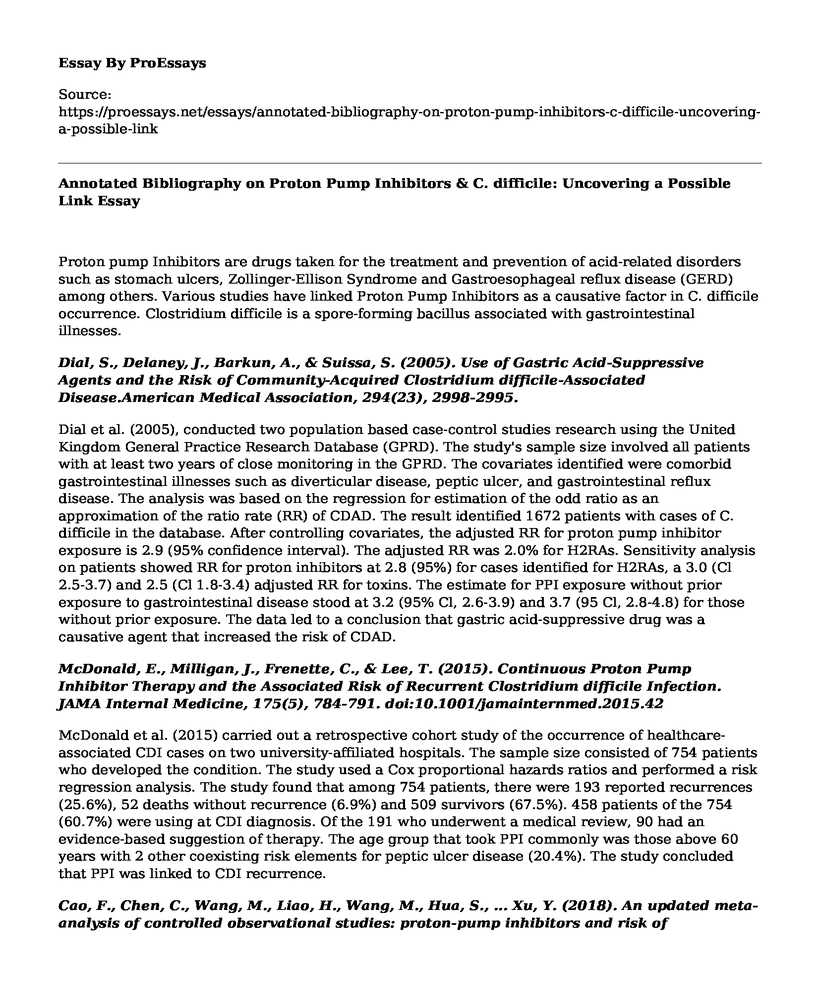Proton pump Inhibitors are drugs taken for the treatment and prevention of acid-related disorders such as stomach ulcers, Zollinger-Ellison Syndrome and Gastroesophageal reflux disease (GERD) among others. Various studies have linked Proton Pump Inhibitors as a causative factor in C. difficile occurrence. Clostridium difficile is a spore-forming bacillus associated with gastrointestinal illnesses.
Dial, S., Delaney, J., Barkun, A., & Suissa, S. (2005). Use of Gastric Acid-Suppressive Agents and the Risk of Community-Acquired Clostridium difficile-Associated Disease.American Medical Association, 294(23), 2998-2995.
Dial et al. (2005), conducted two population based case-control studies research using the United Kingdom General Practice Research Database (GPRD). The study's sample size involved all patients with at least two years of close monitoring in the GPRD. The covariates identified were comorbid gastrointestinal illnesses such as diverticular disease, peptic ulcer, and gastrointestinal reflux disease. The analysis was based on the regression for estimation of the odd ratio as an approximation of the ratio rate (RR) of CDAD. The result identified 1672 patients with cases of C. difficile in the database. After controlling covariates, the adjusted RR for proton pump inhibitor exposure is 2.9 (95% confidence interval). The adjusted RR was 2.0% for H2RAs. Sensitivity analysis on patients showed RR for proton inhibitors at 2.8 (95%) for cases identified for H2RAs, a 3.0 (Cl 2.5-3.7) and 2.5 (Cl 1.8-3.4) adjusted RR for toxins. The estimate for PPI exposure without prior exposure to gastrointestinal disease stood at 3.2 (95% Cl, 2.6-3.9) and 3.7 (95 Cl, 2.8-4.8) for those without prior exposure. The data led to a conclusion that gastric acid-suppressive drug was a causative agent that increased the risk of CDAD.
McDonald, E., Milligan, J., Frenette, C., & Lee, T. (2015). Continuous Proton Pump Inhibitor Therapy and the Associated Risk of Recurrent Clostridium difficile Infection. JAMA Internal Medicine, 175(5), 784-791. doi:10.1001/jamainternmed.2015.42
McDonald et al. (2015) carried out a retrospective cohort study of the occurrence of healthcare-associated CDI cases on two university-affiliated hospitals. The sample size consisted of 754 patients who developed the condition. The study used a Cox proportional hazards ratios and performed a risk regression analysis. The study found that among 754 patients, there were 193 reported recurrences (25.6%), 52 deaths without recurrence (6.9%) and 509 survivors (67.5%). 458 patients of the 754 (60.7%) were using at CDI diagnosis. Of the 191 who underwent a medical review, 90 had an evidence-based suggestion of therapy. The age group that took PPI commonly was those above 60 years with 2 other coexisting risk elements for peptic ulcer disease (20.4%). The study concluded that PPI was linked to CDI recurrence.
Cao, F., Chen, C., Wang, M., Liao, H., Wang, M., Hua, S., ... Xu, Y. (2018). An updated meta-analysis of controlled observational studies: proton-pump inhibitors and risk of Clostridium difficile infection. Journal of Hospital Infection, 98(1), 4-13. doi:10.1016/j.jhin.2017.08.017
Cao et al. (2018) sought to link PPI therapy to C. difficile occurrence by examining previous researches on the same. Their study drew articles from Cochrane Library, Embase, PubMed, China National Knowledge Infrastructure and Medline. Of the 45 studies that were evaluated, the study found that RR for hospital-acquired CDI was 1.29 (1.14-1.44) while that of community-associated CDI stood at 1.17 (0.74-1.59). After restricting the studies to hospital departments, the RR was 1.43 (0.74-2.11) for ICUs and 1.29 (1.13-1.145) for general wards. The calculate publication bias absence from the Begg test was P= 0.3100. A cumulative meta-analysis from the studies indicates that since 2011, there has been a decline in the association between risk of developing CDI and PPI use and that the risk was relatively stable inside an effect size or 1.20 and 1.26. From the stratified articles, the risk of contracting CDI from cohort studies was 1.57 (1.16-1.98), and from case-control studies, RR was 1.20 (1.05-1.34). The increase was high in cohort studies. From its review, the study concluded from the quantitative meta-analysis that PPI was a risk element for acquiring CDI.
References
Cao, F., Chen, C., Wang, M., Liao, H., Wang, M., Hua, S., ... Xu, Y. (2018). An updated meta-analysis of controlled observational studies: proton-pump inhibitors and risk of Clostridium difficile infection. Journal of Hospital Infection, 98(1), 4-13. doi:10.1016/j.jhin.2017.08.017
Dial, S., Delaney, J., Barkun, A., & Suissa, S. (2005). Use of Gastric Acid-Suppressive Agents and the Risk of Community-Acquired Clostridium difficile-Associated Disease.American Medical Association, 294(23), 2998-2995.
McDonald, E., Milligan, J., Frenette, C., & Lee, T. (2015). Continuous Proton Pump Inhibitor Therapy and the Associated Risk of Recurrent Clostridium difficile Infection. JAMA Internal Medicine, 175(5), 784-791. doi:10.1001/jamainternmed.2015.42
Cite this page
Annotated Bibliography on Proton Pump Inhibitors & C. difficile: Uncovering a Possible Link. (2022, Dec 28). Retrieved from https://proessays.net/essays/annotated-bibliography-on-proton-pump-inhibitors-c-difficile-uncovering-a-possible-link
If you are the original author of this essay and no longer wish to have it published on the ProEssays website, please click below to request its removal:
- Research Paper on Vulnerability of the Elderly
- Public Health Critical and Reflective Essay
- Essay Sample on Interruption of a Pregnancy with a Live Fetus
- Essay Sample on Nutrition-Related Problems
- Policy Training Plan Paper Example
- Essay Example on US vs Canada: Comparing Healthcare Systems
- Essay Example on Genetic Diseases: Single Gene Inheritance & Its Types







